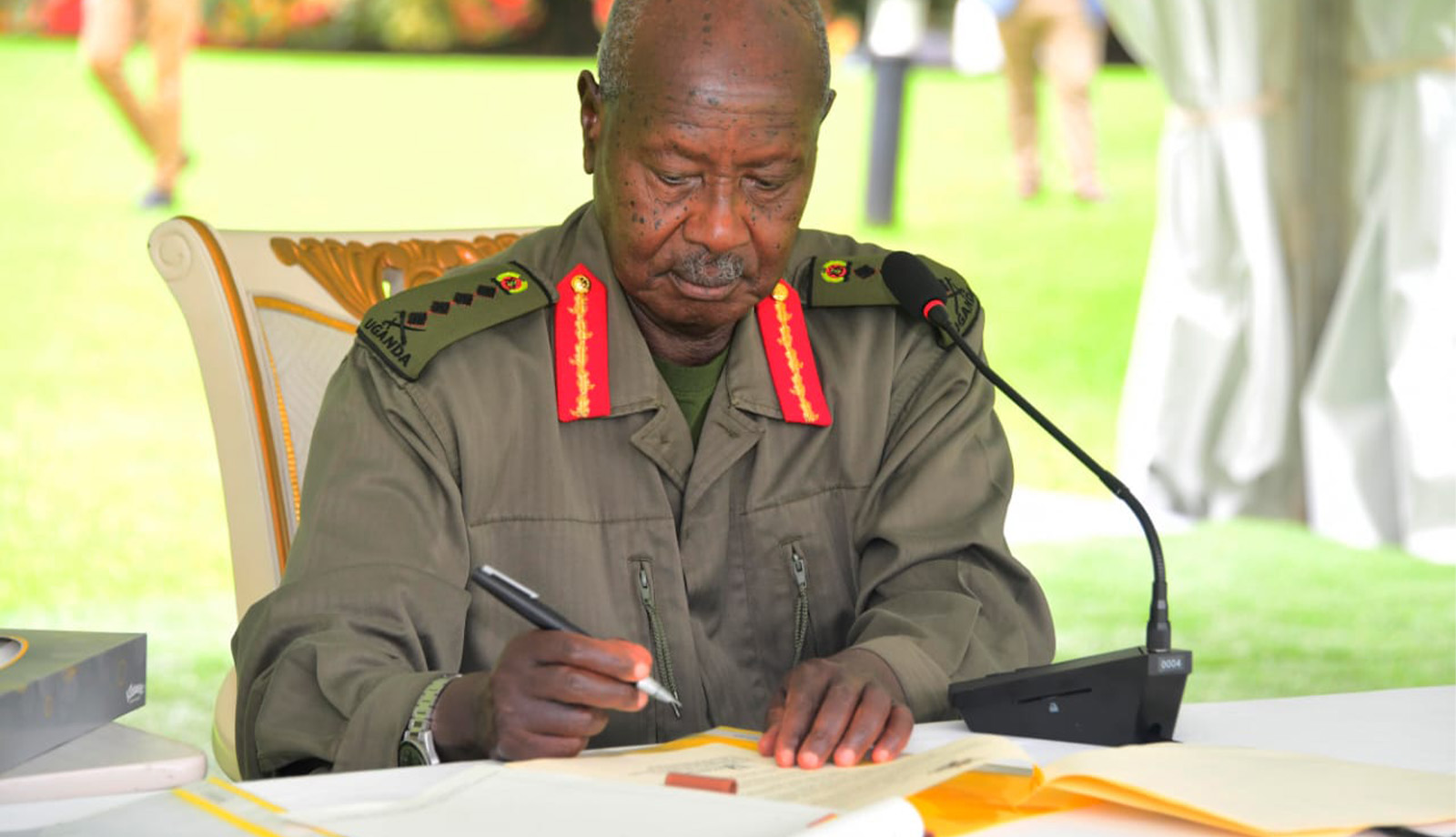President Yoweri Museveni has signed into law the Uganda People’s Defence Forces (UPDF) Amendment Bill, 2025, a controversial move that expands the authority of military courts to prosecute civilians under specified conditions, drawing sharp criticism from opposition leaders and human rights defenders.
MP Okot Bitek Denies Defection to NRM, Reaffirms Loyalty to Opposition
Judicial Inertia Keeping Me from Home – Ssemakadde
Ugandans Celebrate Father’s Day with Love and Appreciation
NUP Clarifies Certification Process for Aspiring Candidates
Teso Leaders, Security Chiefs Vow to Safeguard Peace and Spur Development
Lands Ministry Launches Centralised Ground Rent Collection System
Museveni Meets German Ambassador as PLU Members March to Embassy
Eron Kiiza Petitions Court to Release Passport for Urgent Medical Travel
Young Man Electrocuted While Carrying Tent for ID Registration Exercise
Bishop Bifaaki Vows to Unseat Nsegumire After Picking NUP Forms
NUP Records Massive Turnout Despite Security Raid
The amended law, passed amid a boycott by opposition legislators, grants military tribunals jurisdiction over civilians found in unlawful possession of military equipment or accused of colluding with UPDF personnel in grave offences such as treason, terrorism, and murder. It also provides for the appointment of advocates qualified at the level of the High Court as judges of the General Court Martial.
According to Clause 119 of the amended UPDF Act, military courts may now try civilians “who aid or abet members of the armed forces in committing service offences or are found in possession of arms, ammunition, equipment, or supplies intended exclusively for use by the UPDF.” The law empowers the President, as Commander-in-Chief, to designate areas and categories of civilians who fall under military jurisdiction, subject to publication in the Gazette.
Opposition figures have described the new law as a significant erosion of civil liberties and an affront to constitutional safeguards. National Unity Platform (NUP) leader and Leader of the Opposition in Parliament, Joel Ssenyonyi, branded the enactment “rushed and draconian,” arguing that it amounts to “an attempt to legitimize illegitimacy.”
“This law is designed to instill fear among citizens and suppress political dissent under the guise of national security,” Ssenyonyi said.
His remarks echo growing concern from civil society organizations, which have condemned the legislation as a threat to Uganda’s democratic trajectory and judicial independence. Human rights watchdogs warn that the expanded powers could be used to silence critics, activists, and opposition figures under the pretext of military offences.
“This law reverses the gains made in promoting civilian oversight and due process,” said Sarah Bireete, Executive Director of the Centre for Constitutional Governance. “It disregards recent judicial pronouncements and opens the floodgates for abuse.”
The enactment comes barely months after the Supreme Court ruled that subjecting civilians to military court proceedings contravenes Article 28 of the Constitution, which guarantees the right to a fair hearing before an independent and impartial court established by law. The court emphasized that military tribunals are meant for disciplinary matters involving service members, not civilians.
Legal experts are now warning that the new law could trigger a fresh round of constitutional litigation. “It flies in the face of established legal precedent and risks throwing the country into a constitutional crisis,” noted Prof. Joe Oloka-Onyango, a constitutional law scholar.
The bill was passed by Parliament on May 23, 2025, with the ruling National Resistance Movement (NRM) using its numerical strength to approve it in the absence of opposition MPs, who staged a walkout in protest. Speaker Anita Among later defended the passage, insisting it followed parliamentary rules and addressed national security concerns.
Defense and Veterans Affairs Minister Vincent Ssempijja, who tabled the bill, argued that the amendment was necessary to address the evolving nature of threats facing Uganda, including terrorism, cyber warfare, and illicit arms trafficking.
“Civilians collaborating with hostile forces must face justice swiftly and decisively,” Ssempijja said. “This law is not about politics; it is about defending the country.”
Read Also
Uganda, Maldives Pledge Closer Ties as Envoy Presents Credentials
UNEB Sets June 15 Deadline for 2025 Candidate Registration
K9 Dog Leads Police to Murder Suspects in Ntungamo Killing
Museveni Warns Voters Against Accepting ‘Stolen Gifts’ from Politicians
Speed Limit Rules Trigger Backlash, Government Suspends Automated Traffic Fines
Air India Survivor Speaks out, Recalls Terrifying Moments
Opposition parties, including NUP, FDC, and JEEMA, have vowed to petition the Constitutional Court to block the implementation of the law. Human rights lawyers and activists are also preparing legal arguments to challenge what they term an unconstitutional overreach by the executive and legislature.
If upheld, the UPDF Amendment Act, 2025 would significantly reshape the legal landscape of Uganda’s justice system, blurring the line between military and civilian jurisdictions a move critics warn could pave the way for increased authoritarianism under the guise of security.





